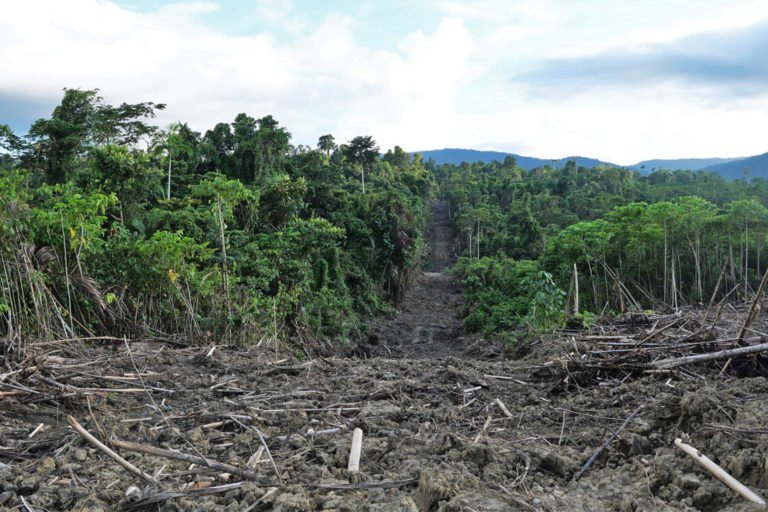- Two more palm oil companies in Indonesia that sued a local official for revoking their permits have had their lawsuits rejected.
- They join a growing list of palm oil firms being held to account for legal and administrative violations that were uncovered in a May 2021 audit of oil palm concessions across West Papua province.
- Four other lawsuits filed on similar grounds by other companies have also been thrown out since December 2021.
- Activists have welcomed the verdict, saying it’s an opportunity for the government to give the concessions back to the Indigenous communities who live on the land.
JAKARTA — A court in Indonesia has dismissed lawsuits filed by two palm oil companies against a district head who revoked their permits over various violations. The May 23 rulings mark the latest in a string of legal defeats for palm oil companies who lost their licenses to operate in Indonesia’s West Papua province.
PT Anugerah Sakti Internusa (ASI) and PT Persada Utama Agromulia (PUA) had filed separate lawsuits on Dec. 29, 2021, against Samsuddin Anggiluli, the head of South Sorong district in West Papua province. But the judges hearing the cases in the Jayapura State Administrative Court ruled that the revocations ordered by Samsuddin, on the basis of various legal and administrative violations by the companies, was justified.
“This ruling highly upholds the sense of justice, especially for the preservation of the environment in Papua,” Pieter Ell, a lawyer representing Samsuddin, told local media.
The lawyer representing both companies, Iwan Niode, said that the judges’ argument that the lawsuits were submitted after the deadline had passed was not valid.
“It’s clear that we will appeal the verdict because the judges didn’t take into account our administrative objections,” he told local media.
In December 2021, the same court threw out similar lawsuits against the head of neighboring Sorong district that had been filed by two other companies whose licenses were also revoked. A month later, the court also rejected two lawsuits filed by a third company against the Sorong district head.
The permit revocations were carried out in May 2021 following a province-wide audit of oil palm plantation licenses, which was started in 2018. According to the government audit, PUA had secured a location permit for 12,100 hectares (29,900 acres) of land and ASI for 14,667 hectares (36,243 acres). However, neither company had acquired a right-to-cultivate permit, or HGU, the last in a series of licenses that oil palm companies must obtain before being allowed to start planting. That meant they hadn’t started planting oil palm trees by the time they were supposed to, which is an administrative violation and which prompted the South Sorong district government to revoke their licenses.
The government audit found PUA’s and ASI’s respective concessions still comprised 97% and 96% intact forest.
The two companies are members of a corporate plantation group called Indonusa Agromulia. Indonusa isn’t a member of the Roundtable on Sustainable Palm Oil (RSPO), the world’s leading sustainability certification scheme for palm oil, and doesn’t have a so-called NDPE policy that would commit it to zero deforestation, no peatland development, and no exploitation of communities and workers.
Nico Wamafma, forest campaigner at Greenpeace Indonesia, welcomed the court rulings, calling them a victory for Indigenous Papuans who live in the concessions. He said the court had ruled in line with the government of West Papua to protect the region’s Indigenous residents.
“It’s better for all related parties to obey and carry out the court ruling, and we will continue to monitor this [case],” Nico said.
He added the South Sorong case should be a lesson for other district heads and mayors to be more judicious about awarding plantation licenses. He also called on national lawmakers to see the recent string of court rulings as a catalyst to finally pass a bill on Indigenous rights, which has been languishing in parliament for a decade.
The bill, submitted to parliament in 2012, was meant to provide recognition of the customary laws and land rights of Indigenous communities across Indonesia. Many of the concessions whose permits were revoked were also the subject of competing claims between the palm oil companies and Indigenous and local communities. With the companies now out of the picture, the passage of the Indigenous rights bill would provide the legal basis for granting these communities the right to take back control of the land and manage it, Nico said.
“The protection and recognition of Indigenous rights is one of the way to preserve the remaining natural forests in Bumi Cenderawasih,” he said, using a common term for Indonesia’s Papua region. “That way, Indigenous people will have complete freedom to manage their ancestral areas and can be economically independent without destroying the forests.”
Banner image: A road made by a palm oil company by clearing the forest in Jayapura Regency, Papua. Image by Asrida Elisabeth/ Mongabay Indonesia.
FEEDBACK: Use this form to send a message to the author of this post. If you want to post a public comment, you can do that at the bottom of the page.













